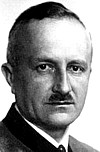Hofrat Dr. Wilhelm Bock CanReg

Personalia
Born:
Died:
Profession:
Persecution:
Imprisonment 14.03.1938 - 17.06.1938,
Dachau concentration camp 17.06.1938 - 04.05.1939,
Imprisonment 10.10.1944. 10.03.1945,
Schörgenhub concentration camp 10.03.1945 - 27.04.1945
KZ Number:
Memberships
Curriculum Vitae
After graduating from the state grammar school in Linz, Wilhelm Bock studied law at the University of Vienna from 1914-1915 and 1918-1920. From 1915-1918, he was deployed on the Italian front - ultimately as a first lieutenant. In 1919, he was admitted to the student fraternity Norica. After completing his doctorate in 1920, he joined the Upper Austrian provincial civil service and was ultimately deputy director of the Upper Austrian Provincial Fire Damage Insurance Institute.
In 1934, he initially served on the advisory board of the city of Linz and from November 7, 1934 until March 12, 1938 as mayor of Linz. In this role, he pushed for "productive unemployment care" through social housing and road construction.
After the Anschluss, he was arrested by the National Socialists on March 14, 1938 and held in police custody in Linz until June 17, 1938. He was then transferred to Dachau concentration camp on June 17, 1938. It was there that his decision to become a priest matured. After his release from prison on May 4, 1939, he entered the Augustinian monastery of St. Florian as a novice. On August 28, 1942, he made his perpetual profession as an Augustinian canon (CanReg) and was ordained a priest in Pulgarn (Upper Austria) on April 10, 1943. He was then appointed chaplain in Lasberg (Mühlviertel), where he was banned from school at the beginning of the new school year. On October 10, 1944, he is again taken into police custody in Linz. He is accused of involvement in a banned political organization in Freistadt. During this detention, he shares a cell with Johann Ude (Cl).
Although he cannot be proven guilty at his trial, he is transferred to the Schörgenhub concentration camp (Kieinmünchen, Upper Austria) on March 10, 1945, where he is released on April 27, 1945.
After the war, he initially works as parish vicar in Lasberg and is then appointed dean of St. Florian from 1947-1955. In 1955-1958, he was appointed custodian of the collegiate church, in 1956 patronage inspector and guest master, and in 1956-1958 vicar, provisor and finally parish priest in Hofkirchen. Finally, from 1958 until his death, he was parish priest in Vöcklabruck, where today - as in various other places - a street bears his name.
Places
Persecution:
Honoring:
Place of activity:
Residence:
Citations
Krause, Peter/Reinelt, Herbert/Schmitt, Helmut (2020): Farbe tragen, Farbe bekennen. Katholische Korporierte in Widerstand und Verfolgung. Teil 2. Kuhl, Manfred (ÖVfStG, Wien) S. 36/37.
